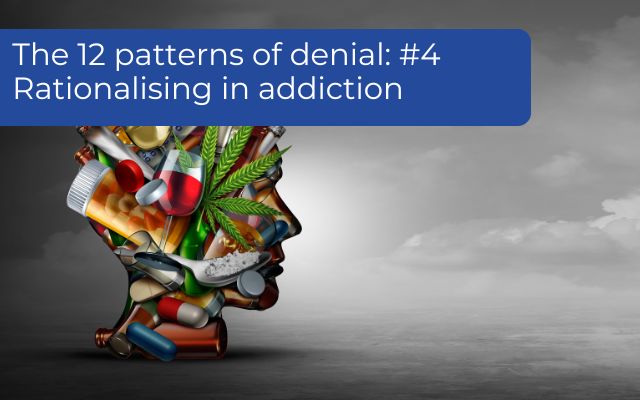In this blog, we will look at rationalising in addiction. People with addiction or substance abuse problems use different forms of denial to keep themselves in the addictive cycle. Denial can be a dysfunctional protection mechanism which you may use to protect yourself from having to recognise, deal with and accept the reality of what is occurring in your life. This is often unconscious.
To recover from addiction, it is essential to be able to identify denial. The 12 patterns of denial were developed by international addiction expert Terence Gorski.
What is Denial in Addiction?
Denial is the first issue to address when addicted persons enter treatment or try other ways of recovering from their substance use disorder.
Denial is when someone
- Ignores reality
- Downplays reality
- Distorts reality
Reality is painful and difficult, and the addict turns to substances or other addictive behaviours to cope – i.e., to escape.
In the words of Dr Diamond: “The addict cannot tolerate reality… Neither internal reality nor external reality”. “They find reality repugnant, uncomfortable, and overwhelming, and prefer, like the psychotic, withdrawal into fantasy, bliss, or oblivion over reality.”
The first of the 12 steps of Alcoholics Anonymous, and other 12-step programmes, is completely geared at confronting and overcoming denial: We admitted that we were powerless over alcohol/drugs – that our lives had become unmanageable.
Without truly confronting and overcoming denial, no matter how much you want to get better, denial will trip you up and prevent you from recovering. This can be a tricky process because denial comes in so many forms and has become so normalised to the addict that they struggle to even recognise when they are using a given pattern of denial.

What is Rationalising in Addiction Denial?
“If I can find a good enough reasons for my problems, I don’t have to take responsibility for dealing with them”
Effective addiction treatment clinical teams must understand rationalisation in addiction, its various forms, its insidious nature, and the critical role of addressing it in rehab. It emphasises the psychological underpinnings and the multi-faceted approaches necessary to help individuals break through this powerful barrier to recovery.
The Insidious Trap of Rationalization in Addiction
“If I can find a good enough reason for my problems, I won’t have to deal with them.” This deceptively simple statement captures the essence of rationalisation, a powerful and insidious defence mechanism that fuels the cycle of addiction. Rationalisation, by definition, is the attempt to explain or justify (behaviour or an attitude) with logical reasons, even if these are not appropriate. While most people engage in rationalisation to some extent in their daily lives, for individuals struggling with addiction, it becomes a dangerous and deeply ingrained denial strategy. It’s a way of avoiding the painful truth of their situation, preventing them from seeking the help they desperately need, and allowing their addiction to progress, often to dire consequences. Top resources emphasise that this isn’t simply lying; it’s a deeply ingrained psychological process aimed at protecting the ego and maintaining the ability to continue using.
Rationalisation serves as a shield, protecting the addict from confronting the reality of their destructive behaviour. It provides a seemingly justifiable excuse to continue using, despite mounting evidence of harm. Addicts aren’t necessarily consciously malicious; they are often caught in a powerful psychological trap, desperately trying to reconcile their actions with their self-image. This defence mechanism allows them to maintain a sense of normalcy and control, even as their lives spiral out of control. Leading addiction websites highlight how this can delay treatment for years, exacerbating the physical and psychological damage.</p>
Common Rationalisations: A Web of Deceit
The justifications used by those struggling with addiction can be remarkably varied and often highly convincing, both to themselves and to those around them. High-ranking articles provide extensive lists of these rationalisations, often categorised by the underlying need they serve (e.g., the need for control, the need to avoid guilt, the need for social acceptance). Here are some common examples:
“I can stop at any time.” This is a classic denial statement, reflecting a belief in their ability to control their substance use. It consistently appears as a primary example in resources discussing addiction denial. It directly contradicts the compulsive nature of addiction and the neurobiological changes it induces.
“I need alcohol or drugs to be sociable.” This excuse links substance use to social interaction, suggesting it’s necessary for feeling comfortable or confident in social situations. Top sources explain how this often masks underlying social anxiety or insecurity, making the individual believe they cannot function socially without the substance.</li>
“I’m not hurting anyone else.” This rationalisation frequently downplays or completely ignores the emotional, financial, and sometimes physical toll addiction takes on family, friends, and colleagues. Many leading articles include personal stories illustrating the devastating impact of this particular rationalisation.
“If you had my problems, you would also be drinking or using.” This deflects responsibility by externalising blame onto circumstances or other people. It’s a common tactic highlighted in addiction psychology resources as a way to normalise unhealthy coping mechanisms.
“I don’t have a problem because my drugs were legally prescribed by a doctor.” This leverages a perceived authority figure to validate substance use, even when it has become problematic. Top health websites emphasise the potential for addiction to prescribed medications and the importance of monitoring their use.
“It’s not the right time for me to quit now; I will stop sometime in the future when I’m ready.” This procrastination tactic, often referred to as “tomorrow syndrome” in addiction literature, avoids immediate discomfort and change, allowing the addiction to solidify further.
“I drink because work has been stressful.” Blaming external stressors is a prevalent justification. Leading occupational health resources discuss the link between stress and substance use but emphasise healthier coping strategies.
“Everyone else drinks this much at social events.” This minimises personal responsibility by comparing their behaviour to perceived norms, even if those norms are unhealthy.</li>
“Using drugs helps me relax and sleep better.” This focuses on short-term perceived benefits while ignoring long-term negative consequences and the disruption of natural sleep patterns.</li>
“I deserve to unwind after everything I’ve been through.” This uses past trauma or hardship as a perpetual license to use, preventing genuine emotional processing and healing. Trauma-informed addiction resources specifically address this.
“My using isn’t as bad as [someone else’s].” This comparative minimisation allows the addict to feel their problem isn’t severe enough to warrant change.
The Insidious Nature of Rationalisation: A Sophisticated Form of Deception
Rationalisation is a more subtle and often more powerful form of denial than outright rejection of a problem. Addicts employing rationalisation often offer seemingly logical and well-reasoned explanations for their continued substance use. This intellectualisation can be highly convincing, making it difficult for both the addict and their loved ones to recognise the underlying deception. Top addiction psychology resources emphasise that this isn’t always conscious manipulation; it’s often an unconscious defence mechanism driven by the brain’s powerful reward system and the fear of facing life without the substance. This sophisticated form of self-deception can create significant barriers to intervention and treatment.
Breaking Through the Denial: Taking Responsibility for Recovery – A Cornerstone of Effective Treatment
For effective addiction treatment to occur and for lasting recovery to be possible, the addict must dismantle these deeply entrenched rationalisations and take full responsibility for their addiction and their recovery journey. Leading treatment centres and addiction specialists universally agree that this is a non-negotiable step. Treatment must directly address this rationalising behaviour through a variety of evidence-based approaches:
Empathetic Confrontation and Cognitive Restructuring: Skilled therapists gently challenge the addict’s justifications, not with aggression, but with empathy and a focus on the objective realities of their situation. Cognitive Behavioural Therapy (CBT) plays a crucial role here, helping patients identify the illogical or distorted thinking patterns underlying their rationalisations and replace them with more balanced and realistic thoughts. Top CBT resources for addiction highlight specific techniques for addressing cognitive distortions.
Motivational Enhancement Therapy (MET): This approach focuses on building the patient’s intrinsic motivation for change by exploring their ambivalence and highlighting the discrepancies between their stated values and their addictive behaviour. It helps them develop their own compelling reasons for recovery, making external justifications for use less appealing.
Dialectical Behaviour Therapy (DBT): For individuals with co-occurring mental health conditions or significant emotional dysregulation, DBT can provide crucial skills in managing intense emotions and reducing impulsive behaviours, thereby undermining the emotional triggers often used to rationalize substance use.</li>
Group Therapy and Peer Support: Sharing experiences with others in recovery provides a powerful reality check. Peers can often see through each other’s rationalisations more clearly and offer direct, relatable challenges based on their own experiences. This sense of shared struggle and accountability can be highly effective in breaking down denial. Leading support group resources emphasise the power of shared experience in overcoming denial.
Psychoeducation on the Disease Model of Addiction: Understanding addiction as a brain disease, rather than a moral failing, can help reduce shame and defensiveness, making individuals more willing to examine their rationalisations objectively. Top addiction education websites provide clear explanations of the neurobiological basis of addiction.
Experiential Therapies: Techniques like psychodrama or role-playing can help individuals externalise their rationalisations and examine them from a different perspective, often revealing their underlying illogicality.
Relapse Prevention Planning: Identifying potential triggers for rationalisation and developing proactive coping strategies is crucial for long-term recovery. Patients learn to recognise the “stinking thinking” that can lead back to use.
Accountability and Consequences: While empathy is essential, effective treatment also involves establishing healthy boundaries and consequences for continued substance use. This can help to disrupt the cycle of rationalisation by making the negative impacts of using more immediate and tangible.
Ultimately, the journey towards recovery requires a fundamental shift from finding reasons to use to finding reasons to heal. By directly addressing the deeply ingrained habit of rationalisation, effective addiction treatment empowers individuals to confront the truth of their addiction, take responsibility for their actions, and actively engage in the transformative process of recovery. This crucial step allows them to move beyond self-deception and build a life based on honesty, self-awareness, and genuine well-being, as consistently emphasised by leading addiction treatment professionals and resources.</p>
Rationalising by definition is the “attempt to explain or justify (behaviour or an attitude) with logical reasons, even if these are not appropriate”. Most of us rationalise but for the addict, this can serve as a dangerous denial strategy that can prevent someone from getting help, causing their addiction to progress and their situation to become more dire.
Rationalising is a defence mechanism used by addicts or alcoholics when they know that their addiction is becoming problematic, but they don’t want to stop. Rationalisation provides them with ‘justifiable’ reasons to continue feeding their addiction.
Like minimising, rationalising is a more subtle form of denial because there is a partial admission by the addict that their using or drinking has become problematic. It is sometimes difficult to argue against an addict using ‘rational’ arguments to justify their substance abuse.
Rationalisation is quite insidious, addicts are ingenious and creative when it comes to justifying their use of drugs or alcohol. It takes a skilled professional to confront an addict tactfully and effectively so that they reconsider the justifications they have been using and recognise that these ‘reasons’ aren’t centred in an objective reality.
Addicts have a strong, often unconscious, desire to protect their addiction and can use the denial pattern of rationalising to keep themselves in denial. Addicts need to break through denial to begin the process of recovery.
Are you or a loved one using the denial pattern of rationalising? We are experts in breaking denial. Contact us today.
Read more about the 12 patterns of denial below:


